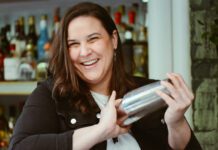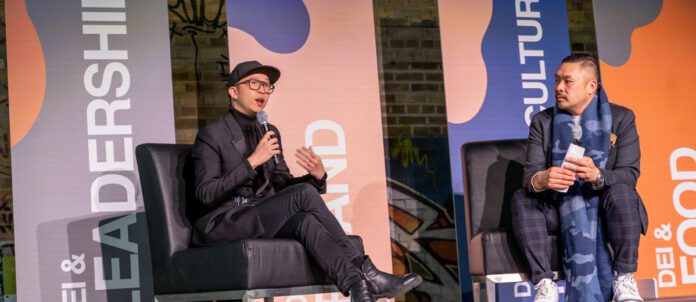By Rosanna Caira and Amy Bostock
TORONTO — The inaugural Quell Unblock Conference was held last week at the Evergreen Brickworks in Toronto. Approximately 150 people attended the event, which focused on diversity, equity and inclusion in the food, drink and hospitality industry.
The brainchild of Quell founders Trevor Lui and Stephanie Lui-Valentim, the Unblock Conference offered education and networking opportunities with all industry sectors — from academia, to business leaders, to operators. The program featured two keynote speakers, an executive panel, workshops, a curated vendor food market and a bodega comprised of 12 small business entrepreneurs.
“This is a monumental occasion for us,” said Lui-Valentim during her opening remarks. “I truly believe this is the first unconference of its kind in Canada. You’re here today because you’ve also made a choice to commit to making a change. So, change starts here as we collectively come together as an industry to learn, to champion the need for better DEI in your organizations, your restaurants, your businesses and your schools to ensure that this is not just a moment — this is a movement.”
The first day of the conference featured a keynote panel titled “Winning Strategy: When stepping to the plate with two or more strikes against you.” Panellists included Erica Karbelnik, Top Chef Canada season nine winner and Chopped Canada season three winner; Erika Casupanan, winner of season 41 of Survivor; and Marissa Leon-John, two-time Master Chef Canada alumni.
Following the panel, attendees kicked back and networked at eh opening party held at Bar Mordecai.
Day two of the conference opened with keynote speaker Justin Wu, award-winning director, photographer and creative director of T&T Supermarket, talking about his life as the child of immigrant parents who had a hard time fitting in.
“I didn’t have the best childhood,” he said. “I had very loving parents but being raised with eastern values at home while being taught western values at school, I had real identity issues. And those translated into a lot of insecurities. I had a hard time assimilating to culture, not knowing who I really was.”
He recalled throwing out his traditional Chinese lunches at school because the other, predominantly white, students would make fun of him and telling his mom he wanted the same things his friends were eating.
“From an early age I had trouble finding my place, but it was the in world of art, the world of film, that I finally found my voice. The real power of entertainment is to be able to look through different eyes, live through different lives all around the world and from that I was able to identify with individuals from different cultures. I was able to find those values that I could associate with and that became my true foundation.”
Leadership Journeys
Following the keynote, attendees were able to choose from concurrent sessions across four pillars: DEI & Leadership; DEI & People/Culture; DEI & Brand; and DEI & Food.
Breaking through invisible barriers: leadership journeys brought together panellists Debbie Shing, co-founder, Vinequity; Hassel Aviles, co-founder/executive director, not9to5; and Cheryl Appleton, founder, Canadian Women in Food. Moderated by Christina Veira, co-owner, Bar Mordecai and owner, Stave, the panel and workshop followed the journeys each woman embarked on in their lives and careers, the challenges they faced along the way and how they overcame — and continue to have to overcome — in order to build success in their respective spaces.
“It’s so great to see so many faces in this room who are interested in progress,” said Shing, who led off the session. “Myself and six other women of colour got together in the summer of 2020 [to form Vinequity] after the killing of George Floyd when we realized that we all had a few things in common in terms of being held back in our positions or being refused opportunities. Of not being seen or heard as a leader in our respective positions. We decided to get together to form an organization that could drive change.”
She said her organization believes in “the campsite rule; we want to leave a situation the same or better than when we found it.”
The group founded Vinequity, a not-for-profit that is mostly a scholarship fund for people that identify as BIPOC in Canada’s beverage industry. “But it’s also a mentorship program, as well as an advocacy and resources platform for people who feel under-represented or want to have a louder voice.”
Aviles, a restaurant-industry veteran, took the floor next to talk about her struggles with mental health and how those led her to form not9to5.
“After so many years in the industry, I found that there was so much neglect of workplace mental health and of the substance-abuse challenges that exist in our industry. And I lived with mental illness myself for many years and just saw a gap. There was so much suppressing and repressing of emotional experiences and decided ‘why not me? No one else is doing this.’ About two years of that slow conversation and open dialogue and awareness led to an incorporated non-profit.”
not9to5 focuses on advocacy, training and education around workplace mental health and has partners all over the globe.
Appleton, founder of social enterprise Canadian Women in Food, talked about how her organization supports women who own their own businesses in the food-and-beverage space. “We have more than 250 members across the country. A 30-year veteran of the food industry, Appleton shared stories about how the industry she’s a part of helped shape who she is.
Session attendees were then broken into groups and each group had one-on-one time with each panellist, asking and answering questions about DEI challenges and strategies within their own organizations.
Decolonizing the Table
At a workshop led by Bashir Munye, professor at George Brown College, the Sommalian-born chef lead an interactive session called Decolonizing the Table, in which he challenged attendees to break the age-old pre-conceptions of food bias and food sovereignty. Through a series of short video interviews with racialized chefs, speaking about the challenges of being a minority in the kitchen, Munye showed how we can work together to dispel some of the myths around food while educating everyone about the importance of changing the face of the food industry. “Just because you’re the first black guy in the kitchen is not good enough,” said Munye.
Before change can be made, Munye highlighted several key points that need to be addressed, starting with acknowledging the role that colonization has played in shaping our food biases. “We cannot talk about our own food biases and our own food sovereignty without really thinking about the rights and sovereignty of indigenous people,” stressed Munye, adding it’s not enough to spout phrases like diversity and inclusion and then “lift the carpet and put the Indigenous experience under it.”
Munye also stressed the dichotomy of changing hiring practices to ensure more representation of racialized communities, while continuing to pay low wages to its workers.
Earlier in the day, a workshop on Neurodiversity at Work highlighted an innovative and unique social enterprise and charity called Melly’s Workshop, which offers an interactive development program for adults with intellectual and development disabilities. The Whitby, Ont. Group was developed for those “who want to work but are looking for support in learning the workplace behaviour required to be a great employee.”
Directors of the group were on hand to walk attendees through the group’s goals, and to introduce and celebrate several of the agency’s workers, looking to find employment.
The program includes 16 development modules such as customer service and time management while focusing on independence, self-advocacy and self-awareness. As part of the agency’s role, adults receive a structured schedule that changes weekly, with different learnings and activities planned for each session. Each student is able to independently manage their schedule and transportation to Melly’s. The organization provides those with developmental challenges a place to learn, grow and develop new friendships. For more information on Melly’s, contact [email protected]
Equitable Hiring
In the session Recruiting and retaining equity-seeking talent, representatives from BIPOC Executive search ran attendees through various exercises — from writing an DEI mission statement to developing interview questions centred on diversity — and facilitating discussion between the groups that highlighted how different employees have different priorities when it comes to choosing a job, and those doing the hiring need to be able to put themselves in their shoes when deciding on potential employees.
Other session topics for the day included designing an inclusive customer journey; a journey in flavour, taste and tolerance; leveraging human-centred design for DEI; and Indigenous food culture.
Breaking Down Barriers
For racialized communities, women, and under-represented minorities, breaking barriers is a common thread in their job trajectory. As part of the industry Executive Panel at the afternoon Plenary session at last week’s fledgling Unconference, two women leaders spoke of their career journeys, highlighting how they worked to break down those barriers to achieve success along the way.
For Janice Bartley, founder and executive director of Foodpreneur Lab, a Toronto non-profit whose mandate is to develop and support emerging and established food entrepreneurs, when she looks back on her journey she admits she came from a “place of frustration provoked into purpose.” Bartley says she heard many no’s along the way but she still pushed through.” Looking back, she believes many of her gains came through allyships, pointing to the strongest ally being the Canadian Food Women’s Network and its director, Cheryll Appleton. “They saw me, they heard me and they understood,” said Bartley, who stressed the importance of not being performative. “You have to do what you say you’re going to do.”
As an entrepreneur, Bartley, says “It’s hard work mentally and emotionally. You don’t know if there’s going to be any money but showing up every day is the beautiful part of what I do. I know what it feels like when your opinion isn’t asked for.” Knowing that has made her a better leader and she’s learned that by asking her team their opinion, she says, “It empowers them,” whether it’s to do a better job or to eventually start their own business.”
Like Bartley, Arora says allyship was important in moving along her career. But she says her parents were her biggest allies. “They believed in me and pushed against the very conservative values in India,” where she was born and raised. “I faced adversity of gender there but when we moved to Canada it was different,” she said, explaining that she spoke a different language and dressed differently. Arora arrived in Canada in 2008, determined to work in the area of M&A, and from the get go, she said she didn’t take no for an answer. But, she adds, sometimes “I stood in my own way.” Today, as part of management at Door Dash, she says her values resonate with the company she works at.
Asked to grade the industry in terms of dismantling barriers, Arora said 10 years ago the score would have been four or five for women in tech. “Today, most of the teams are led by women, but are we at 10? No. There’s still a lot of work to be done so for now it’s a six or seven.” Arora admits that while there’s more awareness today, there’s still a lot more work to be done, stressing the importance of keeping the conversation going.
Bartley agrees, noting “the food industry is doing well but we’re at a three. There haven’t been enough opportunities for [minorities] to access different food experiences.” But with double-digit growth expected in the food industry and more workers needed to support it, Bartley says the “landscape will change whether you embrace it or not.” And, she reminded delegates that Generation Z have zero tolerance to discrimination, which means changes will continue to percolate. “We need to embrace more conferences like this and determine what we can bring to the table,” says Bartley. “We have to be aware of who we are and what we want but it won’t happen overnight. We’re at the tip of the iceberg.”
The final part of the day included more breakout sessions on a range of topics, including leadership in nightlife, bars and restaurants; addressing and overcoming the labour crisis; going beyond land acknowledgements; and appreciation versus appropriation.
The event wrapped up with the closing keynote delivered by John Wiggins, vice-president of Organizational Culture and Inclusion for the Toronto Raptors. Attendees were then invited to the closing reception at Axix for a social cocktail event and fundraiser held in collaboration with Will Lou and Alex Wong.





















